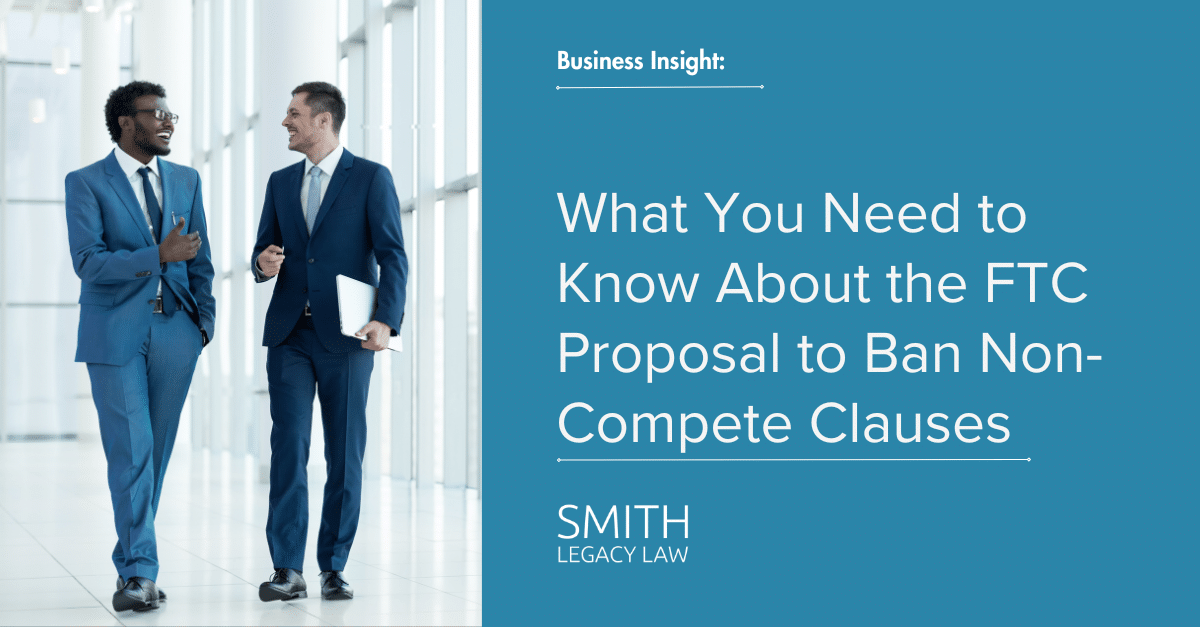On January 5, 2023, the Federal Trade Commission (FTC) proposed a new rule which would ban all non-competes nationwide. Non-competition agreements have been criticized by many labor groups and some states already prohibit them. The difference is that the FTC rules would apply to all states. While at this point, the FTC is just seeking comments on the proposed rule, employers and employees should understand how a ban would potentially affect them and stay abreast of the latest developments.
What Is a Non-Compete Clause?
A non-compete clause is an agreement that limits or prohibits an employee from seeking employment that competes with the employer for a specific time period and in a specific geographic area. Employers use them to protect their business, trade secrets, proprietary business practices, and other competitive advantages in their market.
Typically, signing the agreement is a condition of employment so if the employee refuses to sign he or she will not be hired or will be terminated.
Notably, even where non-competes are legal, there are some well-established limits, such as that the time period and geographic restrictions must be reasonable.
What Is in the FTC Proposed Rule?
The FTC rule would prohibit employers from entering into non-compete clauses with workers (both employees and independent contractors). Further, employers would be required to rescind existing non-compete clauses and actively inform workers that the clauses are no longer in effect. There would be no “grandfathering” allowing existing agreements to continue to be valid.
The stated justification for the proposed rule is that non-competes hurt workers, harm competition, and hinder innovation. Further, employers have less harmful ways to protect confidential information and other key investments than restricting employees’ future employment.
How Does This Affect Your Business?
The proposal is an initial step in the rule-making process. Following public comment, the FTC may issue a new rule that mirrors the proposed rule or make changes. If there is a new rule, it could ban a large portion of non-competes or exclude specific industries or types of workers.
If a new rule is imposed, employers will have to understand and comply with their obligations. This may include notifying workers subject to non-competes that the existing agreements are rescinded, changing hiring practices, and updating employment agreements and other documents to remove non-compete provisions.
In addition, employers would have to explore alternative solutions if they relied on non-competes. An attorney can advise regarding how best to protect business interests, including using non-disclosure agreements and other options.
Should You Consult an Attorney?
The best way to minimize risks to your business is to have a relationship with an attorney who can keep you updated on the FTC Proposal to Ban Non-Compete Clauses as well as other federal, state, and local laws. Our firm can monitor legal and regulatory changes and work with you to ensure that you are not caught off guard and you comply with all obligations.
Our firm works with many clients as General Counsel. We provide services similar to in-house counsel but as an outside consultant and on an as needed basis, so you always have access to a highly skilled attorney or group of attorneys to handle all your legal and business needs.
Contact us to learn more about how we can help your company.
Useful Link for help drafting:
https://www.ftc.gov/system/files/ftc_gov/pdf/noncompete_nprm_fact_sheet.pdf
